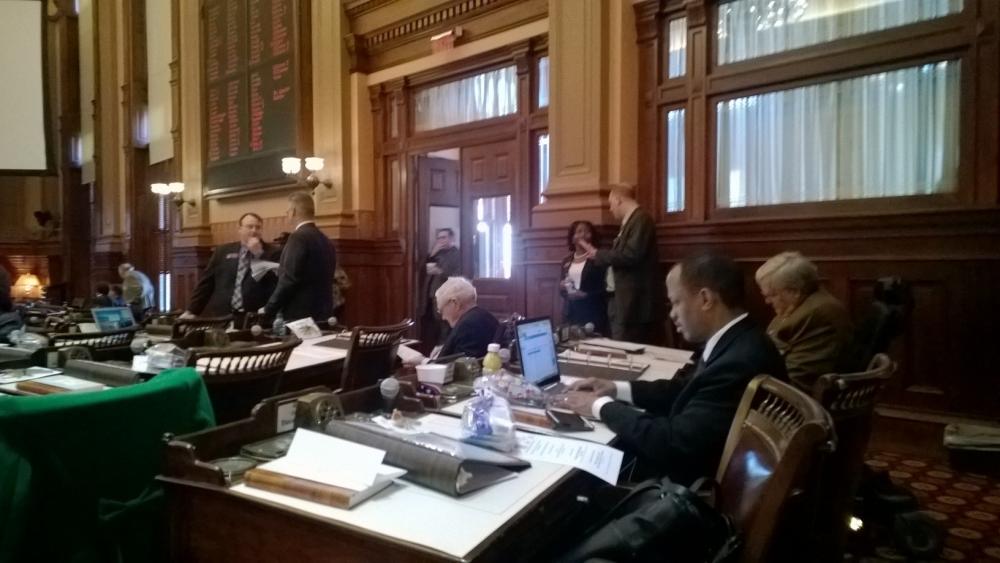
Section Branding
Header Content
Privatizing Foster Care Gets Fresh Support
Primary Content

Do you remember Monday when we told you that the 2014 Georgia General Assembly session was off to a quick start? Here's the good news: we weren't lying. But that's also the bad news (at least, if you're trying to keep on top of things).
On Tuesday, a single day into the session, Republican lawmakers in the Senate used their majority to quickly pass a bill that would move primary elections from July to May. That was despite vociferous opposition from Democrats who wanted to be able to offer amendments.
The same lawmakers also moved local bills on cityhood - which are almost always controversial - to the general calendar. So what? The move means if the Republicans have the votes to pass a bill creating a new city for a particular area - and most likely they will - any opposition among members of the local legislative delegation [read: Democrats] could be moot.
And legislators also spent time on several other pieces of high-profile legislation, including privatizing the foster care system, and allowing guns on college campuses. So much to cover, so little time. Let's get started.
Senators Bicker Over Voting Bills
Moving the primary elections is a top priority because it comes at the behest of a federal court order. The bill would align the state primaries with the federal calendar, to give military and overseas voters at least 45 days of absentee voting.
The early primary means legislators are eager to rush through the session and adjourn so they can do some fundraising (as you may be tired of hearing by now, they can't raise money and legislate at the same time - not in Georgia at least).
Republicans were on a tear Tuesday, and wanted to quickly pass the election bill, which would set the date of the primary at May 20. So they engrossed it. That means, no amendments could be added. It also nixes much discussion and, some would say, means less vetting. And not surprisingly, Democrats objected to such quick maneuvers.
Senator Vincent Fort of Atlanta took issue with his colleague, Republican Ronnie Chance of Tyrone. He was looking to ferret out the politics behind the move but Chance was having none of it.
"You can assure me and the public that this has nothing to do with politics or fundraising?" Fort asked.
"Absolutely not," Chance replied from the well of the Senate.
For those following at home, Democrats would have preferred another primary date, for example June 3, which the court order suggested. With a May 20 primary date, any eventual runoff would fall during the summer when voter turnout tends to be light.
The measure is now on its way to the House. Along with the budget, the bill is arguably the only thing lawmakers really need to accomplish this session.
Gun Legislation A Hot Topic
Lawmakers are also gearing up for what could be an early discussion of gun legislation. The point person on the bill is House member Alan Powell, a strong gun advocate.
The Hartwell Republican said he thinks a bill expanding gun rights will pass this session. He's supporting legislation that would allow licensed gun owners to carry firearms on college campuses (although he says it might wind up including an opt-in provision that gives universities some control).
But he acknowledged there are strong factions on either side of the debate that could make passage difficult (a similar bill failed last year). In fact, he said, there are even factions within the group that supports loosening gun restrictions.
He said some gun owners don't want any kind of law abridging their rights to carry firearms wherever they choose. That's their property, he explained. But he personally would prefer to see some legislation aimed at preventing people with criminal backgrounds or mental health issues from receiving gun permits.
"I don't want a damn fool out there with a firearm," Powell told GPB.
He said gun tragedies like the Newtown, Conn. Elementary school shooting last year do nothing to strengthen what he called the institution of the Second amendment because it gives an opening to those who oppose the expansion of gun rights.
Privatization Discussion Moves To Foster Care System
Advocates for fully privatizing the state's foster care system held a lunch and information session Tuesday near the Capitol.
A trend toward private-public partnerships is underlying the effort to hand the state system for children who cannot live at home with their families to private companies.
(If you look, public-private partnerships are popping up all over Georgia. Advocates say it brings the efficiency of the private sector into the public sector. But many people are wary of them because of worries the bottom line will overshadow the care of children).
Bill Hancock with FaithBridge Foster Care of Alpharetta was on hand at Tuesday's event. His company already works with children in Metro Atlanta through contracts with Division of Family and Children Services, and it's planning to open an office in Glynn County on Georgia's Coast. He said the main benefit of privatization is less bureaucracy. DFCS is a large, centralized state agency.
Privatization, on the other hand, offers the power of "local solutions," he told reporters before the lunch. "Local people can move better."
If his company is already working with DFCS, why does the legislature need to pass a bill privatizing the foster care system?
When asked that question, Hancock said somewhat nebulously, "More flexibility with the funding streams."
Stay tuned.
Not Fast Enough For You?
Lawmakers will not be slowing down one bit during Session Day Three. It will include Gov. Nathan Deal's State of the State speech and the first budget hearings. State Senator Jason Carter, a Decatur Democrat and most likely Deal's Democratic opponent in November, will provide the Democratic response.
